Ghassan Hage is one of Australia's most significant intellectuals. He's still on a quest for a multicultural society that hopes and cares
- Written by Andrew Jakubowicz, Emeritus Professor of Sociology, University of Technology Sydney

It is 50 years – two generations – since then Immigration Minister Al Grassby launched the idea of a multicultural Australia[1] at a Melbourne conference in 1973. Ghassan Hage, Professor in Anthropology and Social Theory at the University of Melbourne, and currently visiting scholar[2] at the prestigious Max Planck Institute for Social Anthropology in Halle, Germany, has become the most significant intellectual commentator on multicultural Australia of the second of those generations.
The Racial Politics of Multicultural Australia – Ghassan Hage (Sweatshop)

















